INTRODUCTION
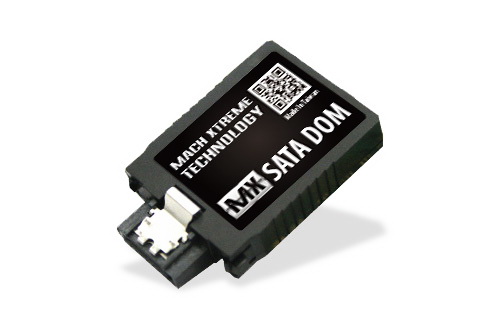
Although we've been trying to focus on bringing some of the latest HDDs, SSDs and USB Flash Drives to hit the market over at NikKTech for testing you might have noticed that we haven't done so with mSATA drives mainly because hardly anyone has asked for such reviews and since we feel we need to test (at least primarily) whatever our readers ask SSDs and HDDs with USB Flash Drives following closely are the things we try most to acquire. However recently some of you asked our opinion about the somewhat new SATA DOM (Disk On Module) drives which are used both in tiny systems and some NAS models (other devices feature such connectors as well) either as boot drives just for the needs of the OS or as storage media for the firmware. Well not many manufacturers make such devices currently and the majority of the ones that do are currently offering them just to system integrators and NAS manufacturers so they are not really available in the market for consumers so the moment Mach Xtreme announced that they are launching their own DIY SATA DOM product line we wasted no time in asking for one to see how it does.
Mach Xtreme Technology was established in early 2010 and is constructed of a combination of elite professionals who have had years of exceptional exposure and involvement in the storage industry. MX-Technology achieves the highest performance possible through its continuous research & development which ensures rapid advancements of SSD, memory and Flash drives. MX-Technology enable their customers to achieve maximum efficiency with matching performance to make time spent on work more convenient and productive. MX-Technology is the first computer hardware company in the world to join force with renowned world class artist to generate unique and stylish representation of Mach Xtreme. The first artist to work with Mach Xtreme is a genius graffiti artist from Europe named "Does". MX-Technology through their full dedication and commitment, its users will be able to continually enjoy the latest high performance products with ultimate reliability at a competitive price point.
We've reviewed quite a few NAS Servers here and I’ve used even more in my life but not many really feature a SATA DOM connector (for example the most recent example of a NAS that has is the N5550 by Thecus) so this market seems to be in its infancy. One of the reasons for that is because most NAS Servers use SATA DOM models with capacities of just 1-2GB so there isn't much reasons for manufacturers to take things onto a new level (hopefully since the DIY SATA DOM by Mach Xtreme is available in capacities of up to 64GB and in both MLC and SLC versions this could change soon). On top of that we have tried in the past to benchmark some SATA DOM models found in some NAS Servers without much luck since we were unable to finish all of our tests (some failed from the very first test in Crystal Disk Mark while others failed during the 2nd test in HD Tune Pro). Aside disappointing in terms of durability this is also a large problem for us since without a base performance to compare the new DIY model this review can't be complete (although we did figure out another way as you will see later on). Well the DIY passed all our tests with flying colors and although we never expected it to compare to a regular 2.5" SSD (it's many times smaller) it actually did surprisingly well.
SPECIFICATIONS AND FEATURES
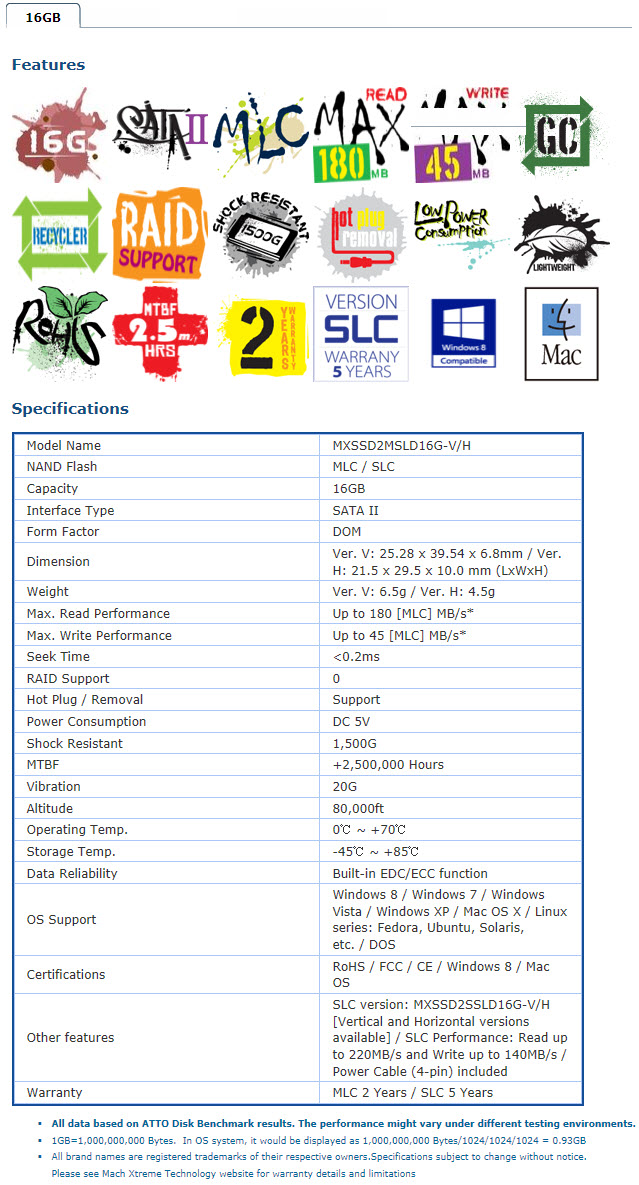
PACKAGING AND CONTENTS
Mach Xtreme uses a very small cardboard box to sell the DIY SATA DOM at the front of which we see two screwdrivers and the product capacity (16GB in our case).
At the rear you can see the model type and connectivity either marked in the two columns or the sticker at the left side.
The DIY SATA DOM along with its Molex power connector and a paper that guarantees the product is in working condition is placed in the box.
THE DIY SATA DOM 16GB
Measuring just 39.54mm in length, 25.28mm in width and 6.8mm in height with a weight of 6.5g the DIY SATA DOM is really tiny.
The barcode along with the serial number are placed on a very small sticker at the rear.
A two pin power connector placed on the left side is used to supply power to the DIY SATA DOM so you can either use the Molex connector found in the bundle or purchase and use a 2 pin power connector if the device you want to use it with has an empty one.
This small switch can be used to write protect the device and thus keep its contents safe.
Due to its tiny size the performance of the DIY SATA DOM is covered by SATA II standards.
The above statement may make some people think twice about just how good this product is so we felt necessary to place it right next to a 2.5" SSD and as you can see the difference is massive (roughly 10 times smaller compared to a 2.5" SSD).
TEST BED


TESTING METHODOLOGY
SATA DOM drives may not be that different compared to SSDs but it seems that they are not as durable and since there's really no reason to push them hard we will be using the same testing methodology as we do with regular HDDs and USB Flash Drives. So once again in order to be almost 100% certain of the results we get and post in our charts we will use the same 6 benchmarking suites in an effort to bring you the most accurate results across the board. Now the only reason why i say effort is because real-world usage is not always on par with what results one gets by running several benchmarks on a drive and that's mainly because there are many variables at work from ambient temperatures to hardware configurations and even firmware versions. The benchmarking applications we use are the AIDA64 suite (former Everest Pro), HD Tune Professional, HD Tach RW, ATTO, Sisoftware Sandra Pro and the Crystal Disk Mark 64bit. These benchmarking tools are the best in what they do and as you will also see later on their results more or less agree. Each test is performed a total of 6 times and then the average is recorded into the charts. The operating system as usual is a fresh installation of Microsoft Windows 7 Ultimate Service Pack 1 with every update installed up until the 8th of March 2014.
Since we have reviewed no other SATA DOM drives and since some of the usages can also be covered with regular HDDs and SSDs we decided to build a comparison in our charts between two HDD models (2.5/3.5") and one SSD model so everyone can see what the device in our hands is capable off. True comparing such a tiny drive against full sized 2.5" and 3.5" drives may not seem fair but we wouldn't be doing so if we didn't feel that there's a valid reason for that.
TEST RESULTS - AIDA64 / ATTO


TEST RESULTS - HD TACH RW / HD TUNE PRO
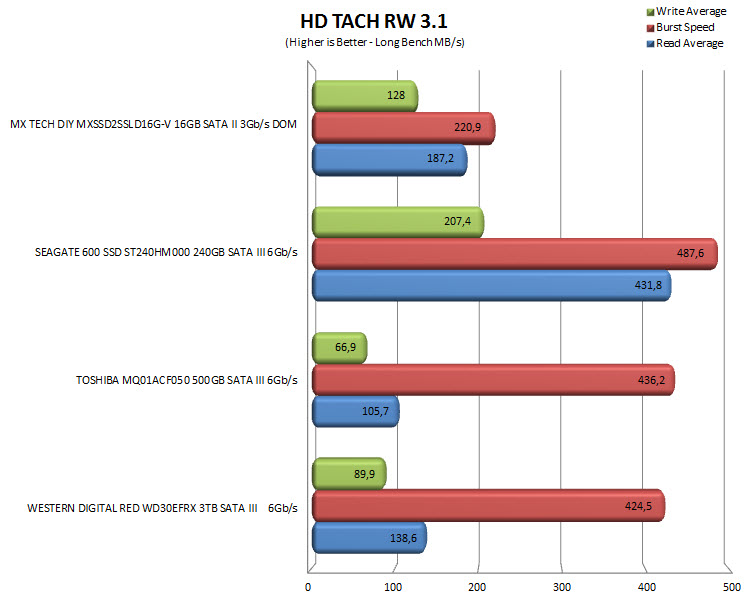
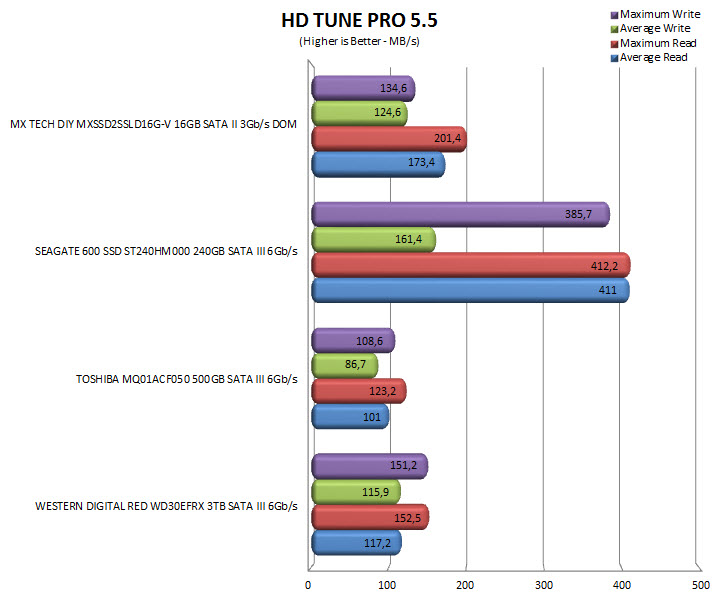
TEST RESULTS - SISOFTWARE SANDRA PRO / CRYSTAL DISK MARK


CONCLUSION
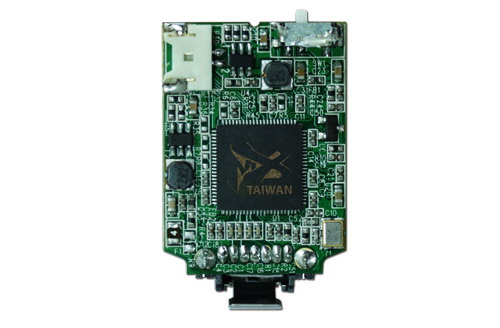
After taking a quick look at our charts we're certain that it's easy for everyone to see why we decided to compare the DIY SATA DOM drive with two 2.5/3.5" HDDs and an SSD. Of course such comparison was hardly necessary since HDDs and SSDs are not fit for the same number of uses like a SATA DOM drive but we thought it would be nice for all of you to see just how fast it is compared to HDDs/SSDs. So although the DIY SATA DOM drive can't really keep up with a regular sized SSD it's obviously a lot faster compared to regular mechanical HDDs and so my guess is that it will not take long before we see SATA DOM drives with performance levels surpassing SATA II bandwidth. True for the majority of consumers SATA DOM drives may not be of much use but for people who have a compatible NAS and/or a small system and just want a few GBs for the OS or to store FW then these tiny devices will improve performance quite a bit.
SATA DOM drives are basically tiny SSDs but thanks to their very small capacities they don't really cost much. So the DIY SATA DOM 16GB (Vertical SLC) model used in our tests currently retails for around USD65 while the version equipped with the slower MLC NAND Flash retails for around USD40 (even this version is faster than a regular HDD and almost certainly faster than factory fitted SATA DOM drives). To most consumers this may seem a bit pricey especially for an 16GB drive but for enthusiasts and professionals who wish to have the best performance the DIY SATA DOM drive by Mach Xtreme with its small form factor and impressive read/write speeds (for its size) will be the ideal partner for their devices and since it proved worthy enough for us to use it in future reviews (especially NAS Server reviews) it's also worthy of our Golden Award.
 PROS
PROS
- Quality (Passed All Our Tests)
- Performance (Better Than Expected)
- Size
- Available Capacities (4/8/16/32/64GB)
- Vertical & Horizontal Models Available
- SLC & MLC Models Available
CONS
- Price (For Some)
- Current Availability

 O-Sense
O-Sense

















.png)

